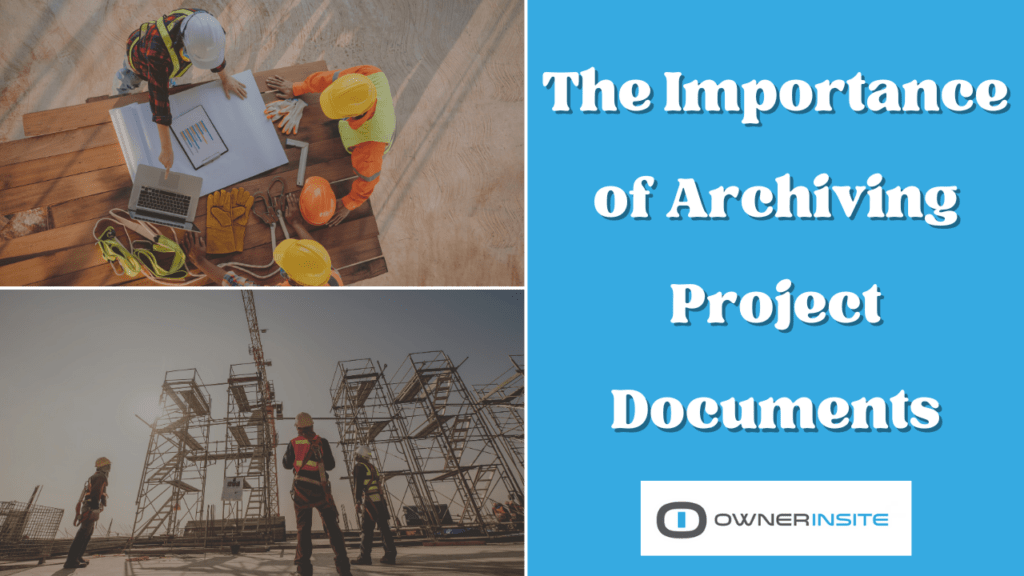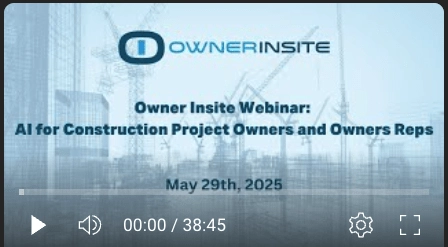Regardless of the type of construction projects, you’re involved in, and no matter your role, one thing is sure. It’s going to create a large amount of documentation.
At least, it will if you’re doing it right. Project documentation is critical to the success of any construction project.
Before your project starts, bid documents, scopes of work, and specifications help to ensure that everyone knows what the project will eventually be.
During your project, it serves as an essential communication channel, and when your project ends, documentation is an integral part of the closeout procedure to include the period throughout the builder’s warranty.
However, many people involved in construction projects miss one very important step in project document control: document retention and archiving. Here’s why it matters and what you can do to improve your own archiving processes.
Teams Change, but Documents Don't
Once you’ve got even a few years of professional work under your belt, you know that teams change all the time. People retire. Some are promoted to other departments. Others move across the country. If you look at any office anywhere in the United States, there are probably very few people who were there ten years ago.
Staffing changes are a fact of life, no matter where you work or what you do, but in the construction, property, and project management world, it can be a bigger problem.
That’s because people directly involved in projects often have a detailed memory of what happened, when, and why. This is great, but realistically, without the paperwork, it can’t protect or defend your interests in court. But things tend to get a little hazy over time for everyone else involved in general oversight or some other part of the process.
If there’s one thing you can be sure about your team in the future, there will be many different faces around the boardroom table. But project documents will never change. This is exactly why you need to use software that will allow you to retain all the documentation and communication in perpetuity.
So even if the people with real-world memories of projects move on, change jobs, or leave to sail around the world, if you archive project documents properly, you’ll always have clear memories of what happened.
Responsibility Extends Beyond Completion
In construction, many people see any project’s completion date as a full stop. An end to the project, never to be revisited again.
But the truth is, while most contractors and construction professionals will move on to the next project quickly, most kinds of project-related responsibility don’t end when holdbacks are paid, and completion certificates are issued. Check out constructionlitigationhold.com for more information.
Architects and engineers can still be liable for building failures related to poor design. Contractors and manufacturers still need to honor latent defect liability periods and warranties.
The actual responsibilities of various parties on any construction project can extend years after the building is handed over and occupied. You read that correctly. That’s why we created constructionlitigationhold.com to help educate and remind everyone of their responsibilities.
Often, when problems do arise after the site offices are gone and the project team has moved on, they will be tackled in mediation and arbitration or even in court. It’s then that the true value of proper document retention and archiving becomes apparent. The cost of discovery alone can easily cost tens of thousands of dollars to you or your organization!
Because so much can change after a particular project is completed, and because companies and teams are so fluid, if you ever must seek legal action – or if someone brings a case against the company you work for – it can be very hard to track down credible witnesses who remember all the facts.
But if you have a digital time-stamped archive storing all the project documentation, you’ll have the perfect witness at your fingertips. Your archive should cut down on discovery costs and allow your construction litigation attorney to focus on what matters, the documents and communication to protect you and your investment.
What Is Project Document Retention?
By now, you’ve probably realized why project document retention and archiving is so important, but if you’ve never paid too much attention to it, you might still be unclear about how to do it properly.
Project documentation is about more than just squirreling paperwork away in dusty boxes. It’s about carefully cataloging and organizing it so that specific information is easy to find. Ideally, you want a searchable system of immutable data that allows for downloading any email thread, file attachment, or photo.
Good document retention practices start long before any construction project finishes, though.
It begins with the very first documents generated for the project. It’s about inputting documents into your software, viewing all specific document logs, and tracking versions and revisions. It’s about keeping not only the documents themselves but also all the supporting information like videos, photographs, email communication, and drawings.
Good project document archiving can be an extremely complex process without software built with the project end in mind.
So, if you’re considering improving your document retention strategies, be sure to include the right technology in your planning and execution.
Owner Insite Makes Document Retention Easy
Project documentation and archiving is more than bundling up all the paperwork and storing it in a filing cabinet or boxes. It’s about ensuring that essential data is preserved and protected, and easy to find when needed. No matter when that might be.
Owner Insite is built to make that as easy and secure as possible.
It’s one part of a project lifecycle tool that gives Owners and their representatives an easy way to store information in the cloud and find it when needed. So contact our team if you need help archiving your data; we’d love to show you how easy proper data retention can be.




